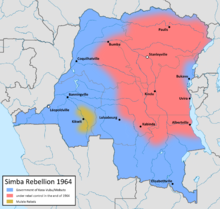
Back تمرد كويلو Arabic Rébellion du Kwilu French Rebelião de Kwilu Portuguese Восстание в Квилу Russian
| Kwilu rebellion | |||||||
|---|---|---|---|---|---|---|---|
| Part of the Congo Crisis and the Cold War | |||||||
 Approximate extent of the Simba (red) and Kwilu rebellions (yellow) | |||||||
| |||||||
| Belligerents | |||||||
|
| ||||||
| Commanders and leaders | |||||||
|
|
| ||||||
| Casualties and losses | |||||||
| Large civilian casualties, including 200 foreigners and at minimum 60,000–70,000 Congolese[1] | |||||||
The Kwilu rebellion (1963–1965) was a civil uprising which took place in the West of what is the modern-day Democratic Republic of the Congo. The rebellion took place in the wider context of the Cold War and the Congo Crisis. Led by Pierre Mulele, a follower of ousted prime minister Patrice Lumumba, a faction of rebel Maoists staged a revolt against the government in the Kwilu District. Based around the struggle for independence, the rebellion was encouraged by economic, social, and cultural grievances.[2] Supported by communist China, rebels used mainly guerrilla warfare against government forces. The rebellion was concurrent with the Simba rebellion occurring in other areas of the Congo during this time. While the rebellion was suppressed in the early months of 1965, it had lasting political impacts, leading to the dissolution of Kwilu as an official province.